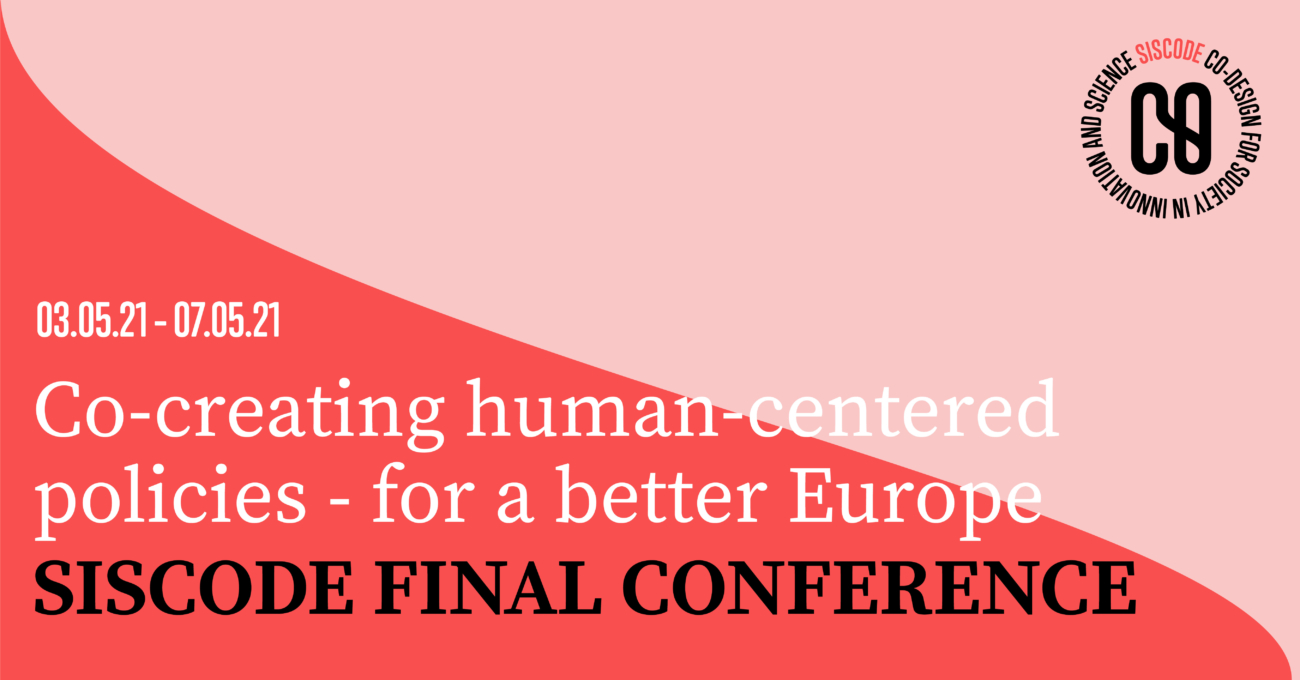
Policymaking in the twenty-first century is undergoing major changes.
The pandemic has amplified already pressing economic, social, and environmental problems, challenging institutions and policymakers to find new and better ways of developing public initiatives and to create more efficient services.
As the world is increasingly characterized by societal issues that are complex and open for interpretation, policymakers need to adopt skills and approaches suitable for handling such challenges.
In this situation, co-creation and design approaches emerge as a possible answer bearing the potential for policymakers to gain an enhanced understanding of their end-user – the objective of their policies.
Creating new solutions with people, not for them, can help drive radical innovation in the public sector. By focusing on citizens’ own experiences and resources, co-creation can help identify truly valuable services and meaning.
Join us in exploring this at the final SISCODE conference “Co-creating human-centred policies – for a better Europe” from May 3rd-7th, 2021. The full programme is available here.
More information and registration
During the free and virtual conference, we dive into the potentials, barriers and outcomes of co-creating policies with our citizens. Each day we explore different perspectives of the co-creation process:
Day 1. Developing a culture of co-creation with citizens
Responsible Research and Innovation (RRI) should make the public an agent of change rather than only a subject of change. During this day Dr.phil. René von Schomberg, will talk about how to turn citizens into a driving force for socially desirable innovation. Madeleine Gabriel, Head of Inclusive Innovation at Nesta, will follow with a talk about how Innovation affects us all, and why it is important to involve a wider society when co-creating policies relating to innovation and technology. Participants will be invited to attend co-creation session, with a focus on co-creating with citizens.
Day 2. The power of empathy in policymaking
Leveraging empathy and applying design in policy making can lead to better policies and more value and impact. Christian Bason, CEO at Danish Design Center, PhD and author of many renowned books on public sector innovation, recently Leading Public Design [2017] will contribute with his research and experience and share specific cases on the power of empathy. This inspirational talk will kick-off a conversation with practitioners who have profound experience with co-creation and the potentials of professional empathy in policy making to discuss barriers and openings. We will explore the views from the strategic political playground, the interactive playground and the operational level and have participants interact and engage during the session.
Day 3. Letting go of power – How do we make sure EVERYONE is involved in the co-creation process?
Giving a voice to everyone often means letting go of power, and this is not an easy task. During the third day of the SISCODE conference, we explore how we can make our practices more equitable and inclusive. Different actors, inclusivity experts in their own domain, will alternatively share their experiences and insights on the different ways to achieve a truthful and successful inclusion.
Day 4. Co-creation ecosystems: Enabling collaboration for sustainable cities
What does a supportive co-creation ecosystem look like and how can it contribute to the sustainability of cities? Participants will learn about the latest research results in the field of co-creation and exciting practice examples. The day examines different co-creation cases in-depth and holds several co-creation session with a focus on complexity, requirements, limits of co-creation as well as the potential for social innovation and reference to the Urban Agenda for the EU.
Day 5. A pledge for a better Europe: Co-creating the future of policymaking
A better Europe requires policies that respond better to societal needs. As a conclusion of 3 years of research and experimentation SISCODE consortium has synthesized the learnings into a pledge – a manifesto – with the ambition to affect and impact future policies and policy making beyond the project. Join the interactive co-creation session with policymakers, civil servants and innovators to discuss, create, qualify and build the foundation of future policies.